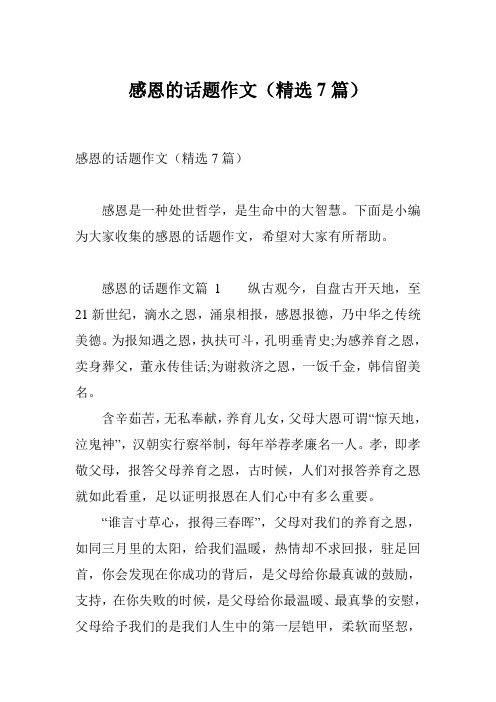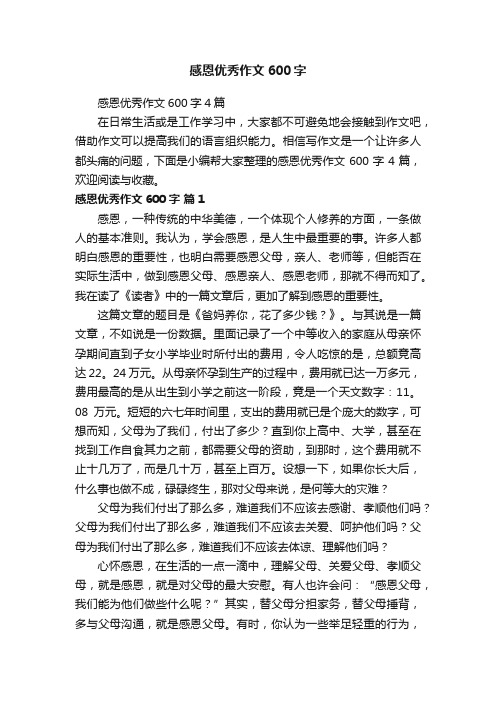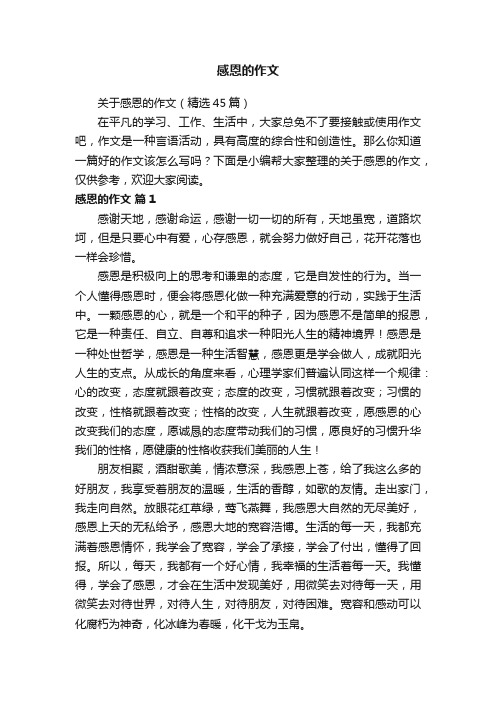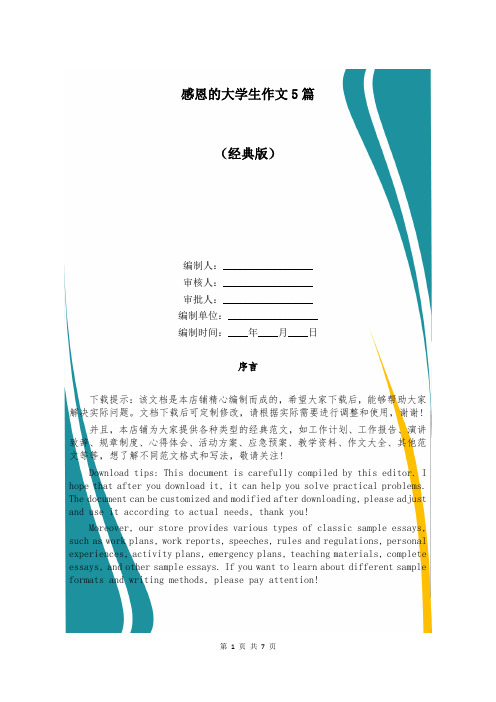感恩是一种美德的作文
以感恩为话题写作文500字

以感恩为话题写作文500字【推荐】以感恩为话题写作文500字10篇以感恩为话题写作文500字篇1感恩是中华民族的一种传统美德,是一种健康的心态,是一种良知,是一种动力。
感恩就是珍爱生命,善待人生,尊重他人,对他人的帮助时时怀有感激之心。
我曾看到过一篇美好的童话故事,这篇童话名叫《知恩图报的戴胜鸟》。
故事是这样的:从前有一对戴胜鸟夫妻,它们年轻的时候辛辛苦苦养育了许许多多的小戴胜鸟,小戴胜鸟长大了,能自食其力了,就都飞走了,这是鸟类世界的无情的自然规律。
而现在,戴胜鸟夫妻老了,没有力气去觅食,曾经明亮的眼睛也看不见了,它们只能无助的呆在窝里等待生命最后的时刻的到来。
有一天,刚好有一只他们的孩子飞过,这只戴胜鸟是一只懂得感恩和知恩图报的小鸟。
他发现父母身体衰弱后,立刻飞去找自己的兄弟姐妹商量,他们一起照顾父母,让父母的眼睛恢复光明,看见蓝蓝的天空,洁白的云朵。
让父母的身体恢复健康,尽情翱翔在天空中。
它们都无比高兴,因为他们知道这是能报答父母的最好礼物。
我看完这篇童话后在心里一遍遍地问自己:如果我的父母老去了,我会像那些小戴胜鸟一样尽心尽力地照顾父母吗?我想我一定会坚定地回答:我会的。
因为父母为了我耗费了精力和青春,给了我无尽的爱与关怀,照顾他们是我的义务和责任。
感恩不需要惊天动地,只要有一些实际行动,一句谢谢都是感恩。
在爸妈辛苦工作一天回到家后送上一杯温暖的水,在他们为我烧好一桌热腾腾的饭菜后说一声谢谢,在家里帮妈妈做一些力所能及的事情。
这也是感恩。
我要做一个知恩图报的人,记住别人对自己的帮助和关怀,用真诚的心去感谢他人,并报答他人。
感恩会使人们的心灵感到温暖,感恩是一种美好的品格,我要学会感恩,用自己真诚的心去回报那些给予过我关爱的人。
如果能拥有一颗感恩的心灵,就可以发现生活的美好和温暖。
以感恩为话题写作文500字篇2花开花落,大雁南飞,时光划破岁月的脸,秋风吹去记忆的尘。
回首往事,忽而明白了许多。
感恩是一种中华传统美德英语作文

感恩是一种中华传统美德英语作文全文共6篇示例,供读者参考篇1Certainly, here is an essay of around 2,000 words on "Gratitude is a Traditional Chinese Virtue," written from the perspective of an elementary school student:Gratitude is a Wonderful Tradition in ChinaHi there! My name is Xiaoming, and I'm a 5th grader at a school in Beijing. Today, I want to share with you about one of the most beautiful and important traditions in Chinese culture –the virtue of gratitude.Ever since I was a little kid, my parents and grandparents have taught me to always be thankful for the blessings in my life. They told me stories about how our ancestors worked really hard to build a good life for their families. They had to overcome so many challenges like wars, famines, and natural disasters. But through it all, they never lost hope or gave up. Instead, they were grateful for what they had, no matter how little.My grandpa loves telling me this old Chinese saying: "If you drink water, remember the source." It means we should never forget where our goo篇2Gratitude: An Enduring Chinese VirtueEver since I was a young child, my parents and grandparents have instilled in me the importance of gratitude. They taught me that being thankful is not just good manners, but a core value deeply rooted in Chinese culture and tradition. As I've grown older, I've come to appreciate just how central this virtue is to our way of life.In Chinese, we have a saying: "一棵树必有它的根" which means "Every tree must have its roots." Just as a tree cannot survive without deep roots drawing water and nutrients from the earth, so too must our values and traditions be firmly grounded in a rich cultural soil. Gratitude is one such root that has nourished and sustained the Chinese people for thousands of years.My grandparents love telling stories from their youth about the hard lives their parents and grandparents endured. Whether subsisting as poor farmers, enduring wars and upheaval, orfacing natural disasters, our ancestors knew profound suffering and hardship. Yet they soldiered on with grit, resilience, and most importantly - a deep sense of gratitude for what little they did have.Grandma often recounts how her own grandmother, despite the family's desperate poverty, would burn the first portion of each meager meal as an offering to the ancestors and heavens above. She did this out of gratitude for the food they did have to eat. Grandma marvels at her great-grandmother's humility and thankfulness in the midst of such deprivation. To this day, our family still burns the first portion of celebratory feasts in her honor.My other grandfather frequently reminds me: "If you aren't grateful for the good things while you have them, you'll only long for them once they're gone." He tells of how during the Cultural Revolution, the family's few篇3Gratitude is a Traditional Chinese VirtueHi there! My name is Li Ming and I'm a 5th grade student here in Beijing. Today I want to talk to you about one of the most important traditional Chinese virtues - gratitude. In China, we aretaught from a very young age to be thankful for the many blessings in our lives.Gratitude has been a core part of Chinese culture and philosophy for thousands of years. One of the most famous ancient Chinese philosophers, Confucius, spoke a lot about the importance of gratitude and appreciation. He taught that we should be grateful to our parents, teachers, and community for everything they do for us. He said gratitude helps develop kindness, respect, and harmony in relationships.Another famous Chinese thinker, Lao Tzu, also promoted an attitude of gratitude. He believed that being grateful helps us appreciate the simple things in life and not take anything for granted. Lao Tzu taught that gratitude allows us to find contentment, even when we don't have a lot of material possessions.In my family, my parents are always reminding me and my little brother to express gratitude. Every morning at breakfast, we take a moment to say what we are grateful for that day. It might be something as small as sleeping well the night before or the delicious food my mom cooked. My parents say this daily gratitude practice helps put us in a positive mindset to start the day.At school, my teachers also reinforce the importance of gratitude. We have a special "gratitude journal" time once a week where we write down things we are thankful for at home, at school, in our community, etc. Sometimes my class reads the journal entries out loud so we can appreciate each other's gratitude too.One way I express my own gratitude is by thanking my parents for working so hard at their jobs to provide for our family. I'm grateful they are able to pay for my education, our home, clothes, food, and other essentials. I try my best to behave, get good grades, and help out with chores to express my appreciation for their efforts.I'm also grateful for my teachers who dedicate their time and energy to teaching our class. They are always patient in explaining new concepts, marking our homework, and helping us when we struggle. On Teacher's Day every year, I make sure to write a special thank you card for my teachers expressing my gratitude.I appreciate having access to excellent public parks, museums, libraries, and community centers right in my city neighborhood. I'm grateful for the hardworking doctors and nurses at the local hospital who have helped me and my familywhen we were sick or injured. I feel fortunate to live in a society with safe roads, clean water, affordable food, and stable housing.My parents remind me that many people in the world don't have these same advantages that I often take for granted. They want me to develop a mindset of abundance and appreciation rather than a mentality of scarcity and entitlement. My dad always says "The more grateful you are, the more blessings you will see in your life."Having an attitude of gratitude doesn't just make me happier - it also motivates me to be a better person who helps others. When I truly appreciate how much I've been given in life, I feel compelled to pay it forward in whatever way I can. This could be through volunteering, donating to charities, being generous to friends and family, protecting the environment, or using my skills and talents to contribute positively to society.Chinese culture places a strong emphasis on gratitude because it cultivates other important moral values like humility, kindness, selflessness, integrity, and compassion. The more thankful I am for my caring parents, knowledgeable teachers, supportive community, and the blessing of living in China, the more I want to be a good son, hardworking student, and model citizen who treats others well.My understanding of gratitude as a traditional Chinese virtue has really helped shape my character. Even though I'm still just a young kid, I already see how being grateful for the good things in my life makes me happier, kinder, and more driven to keep improving myself and making a positive impact.As I get older and face more challenges and responsibilities, I know my attitude of gratitude will continue motivating me. This core Chinese value will help me persevere through difficult times by appreciating the presence of family, friends, mentors, opportunities, and simple joys that others might overlook. Gratitude gives me hope, resilience, and the wisdom to cherish the most important things in life.So in these 2000 words, I've done my best to share why gratitude is such a meaningful traditional Chinese virtue that has personally impacted my life as an elementary student. It is a value woven into the teachings of ancient philosophers, daily practices in households, school activities, and deep-rooted cultural norms across China. Developing this virtue of thankfulness allows me to be a happier, humbler, kinder, and more motivated person who wants to appreciate life's blessings and give back to others.In the words of an old Chinese proverb, "When you drink water, don't forget who dug the well." Gratitude reminds me never to take anything for granted and to treat everyone and everything with respect. I hope that expressing heartfelt gratitude will always remain one of the core virtues I strive to embody as a proud Chinese citizen.篇4Gratitude is a Traditional Chinese VirtueHello everyone! My name is Xiao Ming, and I'm a 5th grade student at Sunshine Elementary School. Today, I want to talk to you about gratitude, which is a very important traditional virtue in Chinese culture.What is gratitude? Well, gratitude means being thankful and appreciating the good things in your life. It's about recognizing all the blessings and kindness that you receive from others, and feeling grateful for them. In Chinese, we call this 感恩(gǎn'ēn).Gratitude is a big part of Chinese culture and values. It's something that has been passed down from generation to generation, and it's still very important today. My parents and grandparents always remind me to be grateful for what I have and to show appreciation to those who help me.One reason why gratitude is so important in Chinese culture is because of the emphasis on harmony and relationships. Chinese culture values strong family ties, respect for elders, and maintaining good relationships with others. By being grateful, we show respect and appreciation for the people in our lives, which helps to strengthen our bonds and create harmony.Another reason is that gratitude is seen as a way to cultivate virtue and good character. In Chinese philosophy, being grateful is considered a moral virtue that reflects a person's humility, kindness, and compassion. It's believed that by practicing gratitude, we can become better human beings and live more fulfilling lives.There are many ways to show gratitude in Chinese culture. One common way is through acts of kindness and reciprocity. If someone does something nice for you, it's important to express your gratitude and find a way to return the favor or pay it forward. This creates a cycle of kindness and appreciation.Another way to show gratitude is through traditional rituals and festivals. For example, during the Qingming Festival (a.k.a. Tomb Sweeping Day), Chinese families visit the graves of their ancestors to pay their respects and show gratitude for their sacrifices and contributions. During the Mid-Autumn Festival, wegive thanks for a bountiful harvest by enjoying mooncakes and spending time with loved ones.In my own life, I try to practice gratitude every day. I'm grateful for my parents who work hard to provide for our family and support my education. I'm grateful for my teachers who patiently guide me and help me learn new things. I'm grateful for my friends who make me laugh and keep me company.I show my gratitude in simple ways, like saying "thank you" sincerely, helping out with chores at home, and being kind to others. Sometimes, I also write little thank-you notes or draw pictures to express my appreciation.By cultivating an attitude of gratitude, we can find more joy and contentment in life. We'll appreciate the little things more, and we'll be more resilient in the face of hardships. Gratitude can also inspire us to be kinder and more compassionate towards others, as we recognize the kindness and support we've received.In conclusion, gratitude is a beautiful and important traditional virtue in Chinese culture. It's about appreciating the blessings in our lives, showing respect and kindness to others, and cultivating a positive mindset. By embracing this virtue, we can strengthen our relationships, develop good character, and find more happiness and fulfillment in life.So, let's all try to be more grateful every day, just like our Chinese ancestors taught us. A simple "thank you" can go a long way in spreading kindness and creating a more harmonious world.篇5Gratitude is a Traditional Chinese VirtueGratitude is a beautiful virtue that has been treasured in Chinese culture for thousands of years. From a young age, we are taught the importance of being thankful for the blessings we receive in life, no matter how big or small they may seem.One of the earliest lessons I learned about gratitude was from my grandparents. Every morning, they would wake up before the sun rose and perform a ritual of bowing to the heavens and the earth, expressing their gratitude for another day of life. They taught me that each new day is a precious gift, and we should cherish every moment we are given.My parents also instilled in me the value of being grateful for the people around us. They always reminded me to express my appreciation to my teachers for their dedication to educating us, and to our neighbors for their kindness and support. Even asimple act of holding the door open for someone or offering a warm smile was seen as an opportunity to show gratitude.In Chinese culture, gratitude is not just a fleeting emotion; it is a way of life. We are taught to be grateful for the food we eat, the clothes we wear, and the roof over our heads. My grandmother used to say, "Every grain of rice is the result of the hard work of farmers, and we should be grateful for their labor."One of the most beautiful expressions of gratitude in Chinese culture is the tradition of offering prayers and sacrifices to our ancestors. This practice not only honors those who came before us but also reminds us to be grateful for the sacrifices they made to pave the way for our future.As I grew older, I learned that gratitude is not just about receiving; it is also about giving back. My parents taught me the importance of helping those in need and being grateful for the opportunities we have to make a positive impact on the lives of others.In school, we were encouraged to volunteer our time and resources to support local charities and community initiatives. It was a humbling experience to witness firsthand the struggles that many people face, and it made me even more grateful for the blessings in my own life.Gratitude is not only a traditional Chinese virtue but also a universal one that transcends cultures and borders. It is a powerful force that can transform our lives and relationships, bringing us closer to those around us and fostering a sense of connection and belonging.As I continue to grow and navigate the challenges of life, I carry with me the lessons of gratitude that have been passed down through generations in Chinese culture. I strive to express my gratitude through my actions, words, and deeds, and to instill this beautiful virtue in those around me.For gratitude is not just a fleeting emotion; it is a way of life that enriches our souls and brings us closer to the true essence of what it means to be human.篇6Certainly! Here's an essay on "Gratitude: A Traditional Chinese Virtue" written in English from the perspective of an elementary school student, with a length of approximately 2,000 words.Gratitude: A Traditional Chinese VirtueHi there! My name is Lily, and I'm a 10-year-old student in the fifth grade. Today, I want to share my thoughts with you about gratitude, which is a beautiful virtue deeply rooted in Chinese culture.In China, we have a saying that goes like this: "When you drink water, think of its source." This proverb reminds us to be grateful for the things we have and to appreciate the people who have helped us along the way. It's a simple yet profound idea that has been passed down from generation to generation.You see, in Chinese culture, gratitude is more than just a feeling; it's a way of life. We believe that showing gratitude is not only polite but also essential for maintaining harmony in our relationships and society as a whole.Let me give you an example. In my family, we always express our gratitude to our parents and grandparents for their love, care, and guidance. We do this by saying "thank you" or "xiexie" whenever they do something for us, no matter how small it may seem. It could be as simple as my mom making my favorite dish for dinner or my dad helping me with my homework. We never take these acts of kindness for granted because we understand the sacrifices our parents make for us every day.But gratitude isn't just limited to our family relationships. In Chinese culture, we are taught to be grateful to our teachers for imparting knowledge and wisdom to us. I always try to listen attentively in class and complete my assignments on time as a way of showing my appreciation for my teachers' hard work and dedication.Even when we receive gifts or favors from friends or neighbors, we express our gratitude by saying "thank you" or offering a small token of appreciation in return. It's a way of acknowledging the kindness and generosity of others and strengthening the bonds of friendship and community.Gratitude is also deeply ingrained in our cultural and religious traditions. During festivals like the Mid-Autumn Festival or the Spring Festival (Chinese New Year), we often pay our respects to our ancestors and express gratitude for their contributions and blessings. We do this by offering prayers, burning incense, or making offerings of food and other items at their graves or family altars.In Buddhism, which has had a profound influence on Chinese culture, gratitude is considered a key virtue. Buddhists believe that cultivating gratitude helps us appreciate the presentmoment and find contentment in life, rather than constantly seeking more material possessions or achievements.But gratitude isn't just about saying "thank you" or following cultural traditions. It's also about developing a mindset of appreciation and humility. When we are grateful, we recognize that our achievements and successes are not solely the result of our own efforts, but also the contributions and support of others.For instance, when I do well on a test or win a prize at school, I don't just celebrate my own hard work; I also express gratitude to my parents for their encouragement and support, and to my teachers for their guidance and instruction. This attitude of gratitude helps me stay grounded and reminds me that I didn't achieve these things all by myself.Moreover, gratitude can have a positive impact on our overall well-being and happiness. When we focus on the things we are grateful for, rather than dwelling on what we lack, we cultivate a more positive mindset and appreciate the beauty and abundance in our lives.I remember once when I was feeling down because I didn't get a toy I really wanted for my birthday. But my mom encouraged me to make a gratitude list, writing down all the things I was thankful for, like my loving family, my friends, myhealth, and the delicious food we have to eat every day. As I wrote down these things, I realized how fortunate I truly was, and my sadness quickly faded away.Gratitude can also strengthen our relationships and create a sense of community. When we express gratitude to others, we make them feel appreciated and valued, which can deepen our connections and foster a spirit of kindness and cooperation.In my neighborhood, we have a tradition of making gratitude cards during the holidays and delivering them to our neighbors, thanking them for being good friends and community members. This simple act not only brightens people's days but also reminds us that we are all part of a larger community and need to support and care for one another.As I reflect on the importance of gratitude in Chinese culture, I can't help but feel a sense of pride and appreciation for my heritage. Gratitude is not just a virtue; it's a way of life that has been woven into the fabric of Chinese society for centuries.In today's fast-paced world, where we are constantly bombarded with messages of materialism and consumerism, it's easy to lose sight of the simple joys and blessings in our lives. But by embracing the Chinese tradition of gratitude, we can learnto appreciate the present moment, cherish our relationships, and find contentment and happiness in the things that truly matter.So, the next time you drink a glass of water, think of its source and the people who made it possible for you to have access to clean, refreshing water. When you receive a gift or kindness from someone, express your gratitude sincerely and wholeheartedly. And most importantly, cultivate an attitude of gratitude in your daily life, appreciating the small moments of joy and the people who make your life richer and more meaningful.Gratitude is not just a Chinese virtue; it's a universal language that has the power to create harmony, foster connections, and bring more light and positivity into our lives and the world around us.。
感恩的话题作文(精选7篇)

感恩的话题作文(精选7篇)感恩的话题作文(精选7篇)感恩是一种处世哲学,是生命中的大智慧。
下面是小编为大家收集的感恩的话题作文,希望对大家有所帮助。
感恩的话题作文篇1纵古观今,自盘古开天地,至21新世纪,滴水之恩,涌泉相报,感恩报德,乃中华之传统美德。
为报知遇之恩,执扶可斗,孔明垂青史;为感养育之恩,卖身葬父,董永传佳话;为谢救济之恩,一饭千金,韩信留美名。
含辛茹苦,无私奉献,养育儿女,父母大恩可谓“惊天地,泣鬼神”,汉朝实行察举制,每年举荐孝廉名一人。
孝,即孝敬父母,报答父母养育之恩,古时候,人们对报答养育之恩就如此看重,足以证明报恩在人们心中有多么重要。
“谁言寸草心,报得三春晖”,父母对我们的养育之恩,如同三月里的太阳,给我们温暖,热情却不求回报,驻足回首,你会发现在你成功的背后,是父母给你最真诚的鼓励,支持,在你失败的时候,是父母给你最温暖、最真挚的安慰,父母给予我们的是我们人生中的第一层铠甲,柔软而坚恝,如此之大恩,岂有不报之理。
“一日为师,终生为父”在我们人生中,老师是我们的再生父母,他对我们的谆谆教导,如春雨灌溉花草般无私。
“尊师敬道”是我们中华民族的传统美德,老师教给我们的知识,让我们拥有智慧,老师教给我们的道理,让我们拥有思想,老师让我们懂得人生与做人,他给予我们的是我们人生中的第二层铠甲,朴实而坚恝。
身处险境,两肋插刀,朋友之恩可鉴天地,萍水相逢,拔刀相助,相遇之恩,可动天地……如此多恩情,是我们人生中的第三层铠甲,华丽而坚恝。
世界虽大,却难以装下天地恩情,大海虽深,却难以容下古今恩情。
以感恩之心对待父母,健康快乐成长。
“老人不图儿女回这作多大贡献,只希望……”父母对我们的最大愿望是希望我们健康成长,常回家看看;以感恩之心对待老师,努力学习,“师愿徒出众”老师的使命是将知识与道理传给下一代,“青出于蓝胜于蓝”“一山更比一山高”,老师最大愿望是自己的学生能好好做人,超越自己。
常怀感恩之心,你会发现清澈的小溪也会笑;常怀感恩之心,你会发现路边的花儿也会笑;常怀感恩之心,你会发现世界如此美妙……感恩的话题作文篇2在这个世界上,有很多值得我们去感恩的人,父母,老师,同学,只要是帮助过我们的人,我们都应该对他们怀有一颗感恩之心。
关于感恩的初中满分作文600字

关于感恩的初中满分作文600字【篇一】关于感恩的初中满分作文600字感恩, 是中华民族的传统美德。
同学之间互相帮助是感恩;父母养育你, 你回报父母, 也是感恩。
可是, 我最感激的还是自己的父母。
20xx年冬天, 我们搬进了新房子, 姥姥姥爷都来为我们温锅。
我在客厅里乐呵呵地玩耍着。
突然, 我一下子晕倒了, 摔在了地板上。
妈妈见状, 连忙抱起地上的我, 和爸爸冲出家门, 奔向了医院。
到了医院, 爸爸赶紧挂上号, 把我送进了急诊室。
妈妈简直要急疯了, 头上的一缕黑头发也都急白了。
谢天谢地!经过二十四个小时的抢救, 我终于从死神的手掌心里逃了回来。
上学后, 我的成绩还算可以。
进入三年级, 我对英语却没有多大兴趣, 成绩也就可想而知了。
这时, 爸爸又给我培养兴趣, 坚持和我一起点读, 共同学习。
整整一个暑假两个多月的时间, 我们把英语第一二册课本重新学习了一遍。
开学后, 四年级的英语竟然变简单了, 我的成绩也从C慢慢地上升到A。
还记得上一次考了97分(只错了一道选择题), 再加上语文和数学竞赛的好成绩, 我们全家非常高兴, 十分幸福。
我们还一起出去散步, 那种感觉太美妙了。
平时, 爸爸妈妈下班很晚, 我多半是7:30才吃晚饭。
有一次, 我就想自己做西红柿炒鸡蛋。
我学着妈妈炒菜的样子, 先把油倒进锅里, 等油热了之后再放入葱花入味。
香味出来后, 打入鸡蛋翻炒, 最后放入西红柿和盐炒熟。
菜总算是炒好了。
但是, 油却溅到了我的右手面上, 烫起了小水泡, 我疼得掉下了眼泪。
父母回家后, 连忙用清水给我冲洗水泡, 帮我擦干净后抹上烫伤药, 我感觉不再那么疼了。
晚上, 父母吃着我做的西红柿炒鸡蛋, 高兴极了, 都夸我是一个好孩子。
鸦有反哺之孝, 羊知跪乳之恩。
我们作为未来的主人, 更应该身怀一份感恩之心。
父母给了我生命, 抚养我长大成人, 给我树立了学习的榜样。
正因为父母对我这么关心, 我才要好好学习, 孝敬父母, 让他们幸福地度过每一天!【篇二】关于感恩的初中满分作文600字清晨, 几声鸟鸣声把我从梦中惊醒, 一缕阳光从窗帘缝中偷偷钻进来, 调皮地拨开我朦胧的睡眼。
感恩是一种美德作文600字

感恩是一种美德作文600字导语:感恩是一种美德,是一种品质。
在生活中,我们需要感谢一些人。
以下为大家介绍感恩是一种美德600字文章,欢送大家阅读参考!朱子治家格言上说:一粥一饭,当思来之不易;半丝半缕,恒念物力维艰,感恩是一种美德作文。
目地就是要让我们懂得感恩和节省。
时时怀着感恩的心是一种善良的美德,也是一个做人的根本条件。
知足的人都懂得感恩,能对一花一草、一山一水都表示谢意的人,他的人生必定是丰富而富足的。
美国某城市有一位史蒂文斯先生,他突然失业了。
他是一个程序员,在软件公司干了 8年,他一直以为将在这里做到退休,然后拿着优厚的退休金颐养天年。
然而,公司却突然倒闭了。
史蒂文斯的第三个儿子刚刚降生,重新工作迫在眉睫。
然而一个月过去了,他没找到工作。
除了编程,他一无所长。
终于,他在报上看到一家软件公司要招聘程序员,待遇不错。
他揣着资料,满怀希望地赶到公司。
应聘的人数超乎想像,很明显,竞争将会异常剧烈。
经过简单交谈,公司通知他一个星期后参加笔试。
凭着过硬的专业知识,笔试中,他轻松过关,两天后面试。
他对自己8 年的工作无比自信,坚信面试不会有太大的麻烦。
然而,考官的问题是关于软件业未来的开展方向,这些问题,他竟从未认真思考过,因此,他被告知应聘失败了。
史蒂文斯觉得公司对软件业的理解,令他耳目一新,虽然应聘失败,可他感觉收获不小,有必要给公司写封信,以表感谢之情。
于是立即提笔写道:“贵公司花费人力、物力,为我提供了笔试、面试的时机。
虽然落聘,但通过应聘使我大长见识,获益匪浅。
感谢你们为之付出的劳动,谢谢!”这是一封与众不同的信,落聘的人没有不满,毫无怨言,竟然还给公司写来感谢信,真是闻所未闻。
这封信被层层上递,最后送到总裁的办公室。
总裁看了信后,一言不发,把它锁进抽屉。
3 个月后,新年来临,史蒂文斯先生收到一张精巧的新年贺卡,上面写着:尊敬的史蒂文斯先生,如果您愿意,请和我们共度新年。
贺卡是他上次应聘的公司寄来的。
感恩优秀作文600字

感恩优秀作文600字感恩优秀作文600字4篇在日常生活或是工作学习中,大家都不可避免地会接触到作文吧,借助作文可以提高我们的语言组织能力。
相信写作文是一个让许多人都头痛的问题,下面是小编帮大家整理的感恩优秀作文600字4篇,欢迎阅读与收藏。
感恩优秀作文600字篇1感恩,一种传统的中华美德,一个体现个人修养的方面,一条做人的基本准则。
我认为,学会感恩,是人生中最重要的事。
许多人都明白感恩的重要性,也明白需要感恩父母,亲人、老师等,但能否在实际生活中,做到感恩父母、感恩亲人、感恩老师,那就不得而知了。
我在读了《读者》中的一篇文章后,更加了解到感恩的重要性。
这篇文章的题目是《爸妈养你,花了多少钱?》。
与其说是一篇文章,不如说是一份数据。
里面记录了一个中等收入的家庭从母亲怀孕期间直到子女小学毕业时所付出的费用,令人吃惊的是,总额竟高达22。
24万元。
从母亲怀孕到生产的过程中,费用就已达一万多元,费用最高的是从出生到小学之前这一阶段,竟是一个天文数字:11。
08万元。
短短的六七年时间里,支出的费用就已是个庞大的数字,可想而知,父母为了我们,付出了多少?直到你上高中、大学,甚至在找到工作自食其力之前,都需要父母的资助,到那时,这个费用就不止十几万了,而是几十万,甚至上百万。
设想一下,如果你长大后,什么事也做不成,碌碌终生,那对父母来说,是何等大的灾难?父母为我们付出了那么多,难道我们不应该去感谢、孝顺他们吗?父母为我们付出了那么多,难道我们不应该去关爱、呵护他们吗?父母为我们付出了那么多,难道我们不应该去体谅、理解他们吗?心怀感恩,在生活的一点一滴中,理解父母、关爱父母、孝顺父母,就是感恩,就是对父母的最大安慰。
有人也许会问:“感恩父母,我们能为他们做些什么呢?”其实,替父母分担家务,替父母捶背,多与父母沟通,就是感恩父母。
有时,你认为一些举足轻重的行为,可能就是对父母的一些感激与关爱;有时,你无意间的细微举动,就会使父母热泪盈眶;又有时,你脱口而出的一声“谢谢”,就会使父母感到欣慰。
关于感恩的作文(精选45篇)

感恩的作文关于感恩的作文(精选45篇)在平凡的学习、工作、生活中,大家总免不了要接触或使用作文吧,作文是一种言语活动,具有高度的综合性和创造性。
那么你知道一篇好的作文该怎么写吗?下面是小编帮大家整理的关于感恩的作文,仅供参考,欢迎大家阅读。
感恩的作文篇1感谢天地,感谢命运,感谢一切一切的所有,天地虽宽,道路坎坷,但是只要心中有爱,心存感恩,就会努力做好自己,花开花落也一样会珍惜。
感恩是积极向上的思考和谦卑的态度,它是自发性的行为。
当一个人懂得感恩时,便会将感恩化做一种充满爱意的行动,实践于生活中。
一颗感恩的心,就是一个和平的种子,因为感恩不是简单的报恩,它是一种责任、自立、自尊和追求一种阳光人生的精神境界!感恩是一种处世哲学,感恩是一种生活智慧,感恩更是学会做人,成就阳光人生的支点。
从成长的角度来看,心理学家们普遍认同这样一个规律:心的改变,态度就跟着改变;态度的改变,习惯就跟着改变;习惯的改变,性格就跟着改变;性格的改变,人生就跟着改变,愿感恩的心改变我们的态度,愿诚恳的态度带动我们的习惯,愿良好的习惯升华我们的性格,愿健康的性格收获我们美丽的人生!朋友相聚,酒甜歌美,情浓意深,我感恩上苍,给了我这么多的好朋友,我享受着朋友的温暖,生活的香醇,如歌的友情。
走出家门,我走向自然。
放眼花红草绿,莺飞燕舞,我感恩大自然的无尽美好,感恩上天的无私给予,感恩大地的宽容浩博。
生活的每一天,我都充满着感恩情怀,我学会了宽容,学会了承接,学会了付出,懂得了回报。
所以,每天,我都有一个好心情,我幸福的生活着每一天。
我懂得,学会了感恩,才会在生活中发现美好,用微笑去对待每一天,用微笑去对待世界,对待人生,对待朋友,对待困难。
宽容和感动可以化腐朽为神奇,化冰峰为春暖,化干戈为玉帛。
学会感恩,我的一颗心永远被温暖笼罩,被甜美滋润,我的生活中没有冰雪,没有冲突,没有愤怒,没有战争,没有咒骂。
我感恩,感恩生活,感恩网络,感恩朋友,感恩大自然,每天,我都以一颗感动的心去承接生活中的一切。
感恩的大学生作文5篇

感恩的大学生作文5篇(经典版)编制人:__________________审核人:__________________审批人:__________________编制单位:__________________编制时间:____年____月____日序言下载提示:该文档是本店铺精心编制而成的,希望大家下载后,能够帮助大家解决实际问题。
文档下载后可定制修改,请根据实际需要进行调整和使用,谢谢!并且,本店铺为大家提供各种类型的经典范文,如工作计划、工作报告、演讲致辞、规章制度、心得体会、活动方案、应急预案、教学资料、作文大全、其他范文等等,想了解不同范文格式和写法,敬请关注!Download tips: This document is carefully compiled by this editor. I hope that after you download it, it can help you solve practical problems. The document can be customized and modified after downloading, please adjust and use it according to actual needs, thank you!Moreover, our store provides various types of classic sample essays, such as work plans, work reports, speeches, rules and regulations, personal experiences, activity plans, emergency plans, teaching materials, complete essays, and other sample essays. If you want to learn about different sample formats and writing methods, please pay attention!感恩的大学生作文5篇在日常生活中,我们经常需要写作文来表达对某个事件或话题的看法,写作文可以帮助我们更好地理解和表达自己的情感,让读者感受到我们内心的世界,以下是本店铺精心为您推荐的感恩的大学生作文5篇,供大家参考。
- 1、下载文档前请自行甄别文档内容的完整性,平台不提供额外的编辑、内容补充、找答案等附加服务。
- 2、"仅部分预览"的文档,不可在线预览部分如存在完整性等问题,可反馈申请退款(可完整预览的文档不适用该条件!)。
- 3、如文档侵犯您的权益,请联系客服反馈,我们会尽快为您处理(人工客服工作时间:9:00-18:30)。
感恩是一种美德的作文感恩之所以是一种美德,因为感恩是一种对爱的支持,对爱的回报。
今天小编就来分享感恩是一种美德的作文,请各位读者好好欣赏和借鉴。
感恩是一种美德的作文(一)怀着感恩的心,一代伟人邓小平古稀之年说:“我是中国人民的儿子,我深深的爱着我的祖国和人民!”怀着感恩的心,诗人艾青他的诗中写到:“为什么我的眼中饱含泪水,因为我对这片土地爱得深沉。
”听说过一个人向树道歉的故事吗?听说过所有正行驶的汽车为狗让路的故事吗?这些真实的故事,感动于人对生命的关爱,感动于人对生命的尊重。
当我们每天享受着清洁的环境时,我们要感谢那些保洁工作者;当我们迁入新居时,我们要感谢那些建筑工人;当我们出行,要感谢司机……懂得感谢,就会以平等的眼光看待每一个生命,重新看待我们身边的每个人,尊重每一份平凡普通的劳动,也更加尊重自己。
怀有一颗感恩的心,才更能体会到自己的职责。
现代社会每个人都有自己的职责、自己的价值。
当XX感动中国十大人物之一的徐本禹走上银幕时,人性的善良再一次被点燃,这个原本该走入研究生院的大学生,却义无返顾的从繁华的城此文来源于文秘家园走进了大山。
这一平凡的壮举刺痛了每一个人的眼睛,也点燃了每一个人内心未燃的火种。
而让他做出这一抉择的理由很简单:怀着一颗感恩的心。
徐本禹用他感恩的心,为大山里的孩子铺就了一条爱的道路,点燃了贫穷和希望,完成了他的职责,实现了他的人生价值。
怀有一颗感恩的心,不是简单的忍耐与承受,更不是阿q,而是以一种宽宏的心态积极勇敢的面对人生。
我相信,最温暖的日子来自寒冷,我更相信,最温暖其实是对寒冷的一种谅解,一种感恩中的感动。
一个人要学会感恩,对生命怀有一颗感恩的心才能真正快乐。
一个人没有了感恩,心就全部都是空的。
“羊有跪乳之恩”,“鸦有反哺之恩”,“赠人玫瑰,手有余香”,“执子之手,与子偕老,”这些都因怀有一颗感恩的心,才芬芳馥郁,香泽万里。
所以我要感谢你,我生命中往来的路人,让我懂得淡来淡去才不牵累于心灵,感谢有你,来来去去,我都会珍惜;感谢你,我生命中所有的师长,让我懂得知识的宝贵,感谢有你,岁岁年年,我都会铭记;感谢你,我生命中至亲至密的朋友,快乐有你分享,悲伤有你倾听,感谢有你,忙忙碌碌,我都不会忘记;感谢你,我至真至爱的亲人,岁月途中,静静的看护着我,挡风遮雨,让我被爱的幸福中也学会了如何去爱他人,感谢有你,日日夜夜,我都留心里。
感谢日升日落,感谢快乐伤痛,感谢天空大地,感谢天上所有的星星,感谢生活,感谢得到和失去的一切,以及无所得无所失的一切的一切,让我草长莺飞的季节里拈起生命的美丽!我的朋友们,让我们怀着感恩的心面向世界吧!让我们怀着感恩的心对待我们的生活吧!只要我们对生活充满感恩之心,充满希望与热情,我们的社会就会少一些指责与推诿,多一些宽容与理解,就会少一些争吵与冷漠,多一些和谐与温暖,就会少一些欺瞒与涣散,多一些真诚与团结,我们的精神家园将永远年轻……最后,让我们一起再来静静地聆听这首《感恩的心》吧:感恩的心,感谢有你,伴我一生,让我有勇气做我自己,感恩的心,感谢命运,花开花落,我一样珍惜。
感恩,是一种心态,一种品质,一种艺术。
感恩是一种美德的作文(二)感恩,就像是一丝明媚的阳光,让我们在黑暗中感光明与幸福;感恩,就像是一场春雨绵绵,滋润我们的心田,感受阵阵芳香;感恩,就像是一缕和煦的微风,渗透我们的灵魂,给予我们激情与力量,鼓舞我们负重前行。
感恩,是一种美德……感恩父母,是他们让我们诞生到这个多姿多彩的世界,体味人间的坦坷辛苦,甜蜜幸福。
感谢他们伴随我们成长,刚我们呱呱坠地的那一刻起,我们的生命就倾注了父母无尽的爱,为我们撑起一片爱的天空。
当我们遇到困难时,给予我们帮助;在我们伤心时,给予我们安慰;在我们伤心时,给予我们安慰;在我们开心时,给予我们祝福……父母,就是这么的无私,那么的百般疼爱我们。
想到这些,你有所感触了吗?那个曾不愿为父母分担家务,曾与父母较劲顶嘴的你感到愧疚吗?辜负父母对你的一片期望,比起你的微不足道,又算什么?感恩父母,其实并不需要很大的付出,哪怕只是芝麻般大,他们也以满足。
父母对我们的养育之恩,我们怎能忘却?“感恩父母,养育之恩!”是我们为人子女的基本美德。
感恩老师,因为老师是我们的一把万能金钥匙。
老师给予我们知识,教育我们做人的道理,摆正我们的人生志向,如红烛一般,融化了我们心灵的冰川,走进了我们的心灵,远离寂寞。
老师的爱,像轻纱般轻柔,像宝石般明亮,像茉莉般清香。
那种爱,无私中透露着平凡,平凡中透露着伟大。
像一股清泉,流进我们的心田;像一种呼唤,替灵魂找到快乐,像一束黎明,照耀着我们成长。
老师,没有华丽的舞台,没有簇拥的鲜花,唯一伴随的是一支支粉笔,那是他们耕耘的犁头,不高的讲台,一叠的作业,是他们无私奉献的战场。
老师,多么的平凡啊!感谢老师,并不难,行动证明一切。
感恩老师,用高高的小手,打破课堂的宁静;用骄人的成绩,夺得老师的信赖;用小小的问候,表达对老师的关心……这些难道不是很小的事情吗?从点滴的感恩老师对我们的付出,“感恩老师,育我成才!”是我们作为学生的基本美德。
感谢朋友,是他们在成长中带给我许多泪水和欢笑,在求学中带给我许多自信和磨难。
朋友,是人生中不可缺少的伴侣。
在人生的旅途上,有了朋友,让你不再孤单,不再寂寞,替你分担解忧,畅谈一切。
在一起玩耍,一起共同进退,一起共同竞争,挥洒一路激情。
在孤独无助时,给予你那双温暖的手,遇到挫折,总是鼓舞着你,做你的坚强后盾。
朋友是一把伞,替你遮挡风雨……感恩朋友,因为他们曾经给予过我们快乐,曾经与我们经历风雨。
“感恩朋友,伴我成长!”这是我们作为朋友的基本美德。
感谢生活,因为他磨炼了我们的意志。
有人说,生活是一面镜子,你对它笑,它也对着你笑,你对它哭,它也对着你哭。
是的,生活给予了我们挫折与磨难,锤炼我们的品质,同时也赐予了我们坚强。
热爱生活的人,他从不吝啬,要看看你有没有抱着一颗感恩的心来接纳生活的恩赐,试着用感恩的心来体会,你会发现不一样的生活。
“感恩生活,让我坚强!”这是我们作为热爱生活者的基本美德。
白云在蔚蓝的天空中飘荡,描绘着一幅幅美丽的画,这是白云对天空的感恩,落叶在空中翩翩起舞,谱写着一曲曲感恩的歌,这是大树对大地的感恩,因为感恩才会有这个多彩的世界,因为感恩才有世间真挚的感情,因为感恩让我明白了生命的真谛……感恩是一种美德的作文(三)我们向父母感恩,感恩他们给了我们躯体与灵魂;我们向师友感恩,感恩他们给了我们知识与友谊;我们向天地感恩,感恩它们给了我们空气与土地……古人云:滴水之恩,当涌泉相报。
我们是这个社会的一员,随时接受着别人的帮助与鼓励,人与人之间有一张大网,她将在世界各地的人们紧密地结合起来。
相比之下,现在有的人往往以自己为中心,作为支配自己行为的内在动力。
他们一意孤行,所有的成就自己享。
我们不得不佩服这种“好汉”精神。
要知道,一个篱笆三个桩,一个好汉三个帮。
《水浒传》中有三十六天罡,七十二地煞,才有梁山泊“替天行道”的忠义大旗;杨丽萍的《雀之灵》有几百个动作,可是幕后又有多少无名英雄呢?如果大家只逞个人英雄主义,不互相感谢,互相鼓励,那么整个社会不就成了一摊散沙了吗?感恩是一束阳光,可消融彼此间的猜疑积怨;感恩是一座桥梁,可将彼此的心灵沟通;感恩是一种镇静剂,可使人在众多的纷扰中恪守平静;感恩是一种润滑剂,可消除人与人之间的摩擦……感恩是有教养的一种标志,也是一种风度,一种美德。
只要人人都学会感恩,世界就会充满阳光!感恩是一种美德的作文(四)书读百遍,其义自见。
有些书即使度了百遍也不明其意。
这样的书不是内容晦涩难懂,就是内容是乱写一通。
书的种类的繁多,又不乏有名家着作,这种书的内容包含作者的真情实感。
或喜,或悲,或忧,往往总是可以引人入胜,其中的思想境界可以提高人的灵魂修养。
而我今天说的,正是属于这类的书。
时光荏苒,岁月飞逝,我们渐渐发现,生命中的感恩正渐行渐远。
有多久,我们没有因为别人的感恩流泪;又有多久,我们不在思索感恩的真谛。
在这平凡的日子中,捧起这本书在墨香氤氲中,学会感恩……童年的记忆中,我们总会在树上爬来爬去,与树嬉戏。
长大后,我们各自被成长的烦恼困扰,再也无心与总是要很晚才回来。
回来后又要拿。
最后男孩老了,就与树一起休息。
这个故事听起来很感人,但是不仅仅是感人。
其实这是我们自己的故事。
父母就像那棵树。
我们小时候喜欢跟父母玩,长大了总是向他们索取,当遇到麻烦是总是找他们,一解决了就离开他们。
你或许会认为这很残酷,但这就是事实。
父母就像那树玩耍,抛弃了它。
书中正有这样一个故事:小男孩从树上索取东西,每一次拿完东西棵树一样为我们的快乐而存在。
父母对子女关爱得多,就显得唠唠叨叨,喋喋不休,做子女的肯定会厌烦。
但是孝顺的子女是应该顾及语相加,伤了他们的心。
如果你想你以后的子女怎么样对你,你现在就要怎么样对到,父母的爱的。
无论父母多么落后,他们永远是你的父母,千万不要以怨报德。
恶你的父育过你?至少母亲曾十月怀胎并把你生到这个世界上能看到这世界的一切。
美的、丑母。
好好珍惜自己的父母。
不管他们是否养的、恶的、好的都是上天和父母赐予你的。
好好对自己的父母,不要到子欲养而亲不在时才谴责自己。
一次离去的结束意味着更远的离去,归期却不可知。
回头再望,家乡是如此美丽,父母身边是何等温馨。
让我们学会感恩,让感恩成为人生中的一种美德。
